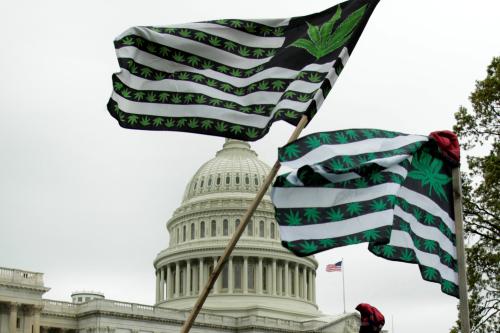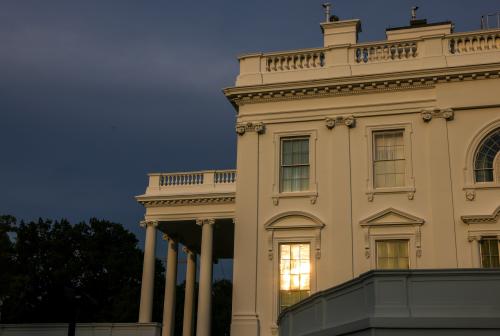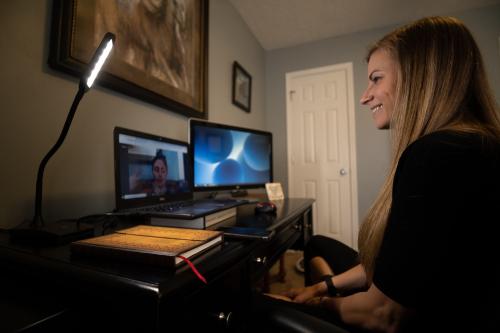In 2020, Oregon voters approved a ballot measure to legalize a psychedelic substance, psilocybin, which is still undergoing clinical trials. Now, the Oregon Health Authority is tasked with the unprecedented challenge of creating its own state-level versions of Food and Drug Administration (FDA) processes, from health provider certifications to accepted use cases.
Traditional sources of evidence, such as experimental academic studies and laboratory clinical trials, are still relatively scarce, so state officials will have to use the very same sources that originally fueled the state’s political movement: the internet.
Because of the illegality of their use, much of the innovation around psychedelic therapy has happened through underground networks of uncertified therapists and the wild west of music festivals. Researchers often turn to Internet forums, YouTube videos, and online health surveys to understand all the ways in which these substances could be used to treat a range of mental health disorders. For instance, an early study on psychedelics for tobacco addiction noted:
“No reports in the scientific literature have described tobacco smoking cessation resulting from non-clinical use of 5-HT2AR agonists [the neurological mechanism for Psilocybin] anecdotal evidence suggests that such accounts are not uncommon. Clinical psychologist Leo Zeff described how spontaneous reflections about tobacco smoking during an LSD experience in the 1960s prompted his own subsequent life-long smoking abstinence (Stolaroff, 2004). Similar reports attributing smoking cessation to psilocybin or other psychedelic use have appeared on websites related to psychoactive substances such as Erowid [an Internet database of psychedelic experiences].”
Spurred by the 21st Century Cures Act, the FDA has begun implementing regulatory guidelines for collecting health data from online sources, but it has been too slow for the peculiarities of psychedelic pharmaceuticals.
To be clear, many online reports come from situations resembling medical oversight—they are not simply from people “tripping” on their own at parties. Decades of underground therapy have also resulted in a loose collection of safety standards and training manuals that inform many academic studies, including FDA-approved trials.
For instance, Vet Solutions funds special forces veterans to receive overseas psychedelic treatments, including Iboga, a potent shrub that is a promising treatment for opioid addiction. In these settings, new patients follow a long list of safety procedures—from medical intake forms to cardiac monitoring—throughout the psychedelic experience.
Despite the strict medical processes, there is still only observational evidence in academic journals for the efficacy of Iboga out of countries, such as New Zealand, where psychedelic treatments are not explicitly illegal.
That is one of the reasons why the influential editorial board of The Oregonian pleaded with citizens ahead of the 2020 election not “to jump ahead of the science too quickly.” However, patient groups, eager for solutions to treatment-resistant illness, have formed overwhelmingly powerful political groups pressuring states to move faster than the relatively glacial pace of decades-long clinical trials.
Some Possible Policy Responses
Much like the legalization of cannabis, voters may have pushed laws faster than some legislatures would have liked. But, now, the way in which lawmakers respond to this pressure can impact public health. In the cannabis market, too many early restrictions on drug access allowed the black market to thrive, and, as a result, laws are being revised.
With psychedelics, to balance safety and the demand for access prior to FDA approval, here are a few policy options.
1. Follow the lead of other nations
Using a legal framework of “international reciprocity,” health boards can adopt the practices of nations where there is demonstrated safety and efficacy. Psychedelic therapy and ceremonial use are common worldwide; when I visited Amsterdam, where psilocybin is sold in retail shops, I found a thriving cottage industry of health retreats. Even in a highly open regulatory system, one study found that there are virtually no incidences of harm or criminality. Thus, state lawmakers can be confident that strict medical oversight of this particular substance may be unnecessary.
Both foreign and native-territory guidelines can also guide riskier drugs. Substances traditionally used in spiritual ceremonies, such as Iboga or the Amazonian tea, ayahuasca, carry more risks, yet are still on the path toward legalization in America. The treatments can involve extreme nausea, heart complications, or detoxification. Over the years, indigenous peoples and doctors practicing in nations outside the US have developed guidelines that reduce medical risks.
2. Legalize a path from social sharing to scientific research
Psychedelic use is quite common, yet it is difficult for researchers to collect data on best practices and adverse events. A promising solution to both increase safety and inform public health comes from California State Senator Scott Weiner, who has introduced legislation to legalize “social sharing” for a wide range of psychedelics and which could pass as soon as next year.
The California bill would not permit a large market like the cannabis industry but would permit small-scale non-commercial use in the kinds of scenarios where psychedelics are commonly used, such as festivals, underground ceremonies, or in nature with friends.
Under this new legislation, rampant psychedelic use could come out of the shadows and be available for study. There are still many nuances to psychedelic-assisted therapy and what settings should be permitted.
For instance, during the pandemic, some practitioners risked the spread of COVID-19 and continued to host in-person events. Indeed, I discovered one popular practitioner who held Zoom events of dozens of participants with the novel compound MDA, and I reported my findings through an ethnographic study. Additionally, the prestigious journal Nature recently published a study from app data that finds a correlation between increased mental wellness and frequent low-dose “microdosing,” which is often done at home.
That is, teletherapy may be an effective form of mental health treatment with psychedelics. Yet, because there is virtually no evidence published in the academic literature on remote facilitation, the Oregon Health Authority and a brand-new New York bill may only permit live, in-person psilocybin experiences.
In Oregon, residents will certainly continue to flout the law. A regulatory system of social sharing similar to the one being proposed in California could provide vital information for how to shepherd the inevitable integration of psychedelics into the public health system. Agencies can then partner with a new cottage industry of psychedelic-friendly software companies, such as Maya Health and Quantified Citizen, to collect and publish findings.
Professor Mason Marks, project lead at Harvard’s new health policy center, Petrie-Flom, similarly concludes in an op-ed for the Journal of The American Medical Association that, “for 50 years, prohibition of psychedelic substances impeded research and deprived people with mental health conditions (many of whom are members of historically marginalized or underserved populations) of viable treatment options.”
3. Sandboxes for insurance reimbursement of lower-cost treatment
Demonstration projects, such as “regulatory sandboxes”, are a way in which states can pilot novel, but risky commercialization. Demonstration projects are used by the Center for Medicare and Medicaid Services to reduce the costs of diabetes, or, in Singapore, to test out telehealth services, which also can be less expensive.
Demonstration projects are regulatory exemptions that are time-limited, have increased reporting requirements, and involve more stringent informed consent protocols. Politically, they are safer than traditional deregulation, which does not have built-in sunset provisions.
Service providers apply to be included in a demonstration project (such as a doctor offering telehealth services) and are approved by an agency overseeing the project.
In the case of psychedelics, demonstration projects could help control sky-high costs. Psychedelic therapy has already received criticism because of its relatively high cost, which can be upwards of thousands of dollars out-of-pocket. In the middle of a mental health crisis, one-on-one, in-person licensed therapy is in short supply, which drives up prices.
There are a variety of lower-cost strategies. For instance, a new mental health hotline, Fireside, offers peer telehealth counseling for those going through very challenging psychedelic experiences as an alternative to traditional emergency services.
Peer counseling and other roles that do not have lengthy occupational licensing standards may be an essential solution to both increase the supply of health counselors and decrease their cost.
Government health insurances are still reluctant to cover treatments outside of FDA approval, even if a state has legalized it and it is more cost-effective. And, as a result, agencies and government insurances cannot utilize lower-cost treatments in states that jump ahead of the FDA. In these cases, if outcomes from a demonstration show promise for a particular drug or counseling service, the state could legislatively include it for insurance reimbursement, improving access for patients, and saving the state money.






Commentary
How technology is transforming mental health assessment and treatment
January 25, 2022